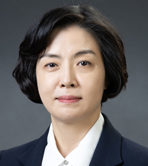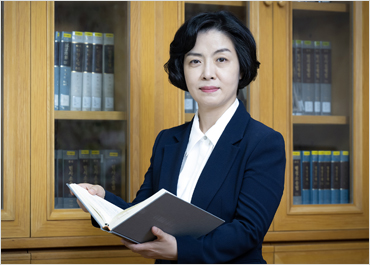
LEE Sook Yeon
The Honorable LEE Sook Yeon was born in Incheon on August 14, 1968. After graduating from the Pohang University of Science and Technology (POSTECH), Judge Lee developed an interest in law and later transferred to the Korea University College of Law. She passed the 36th National Judicial Examination as a student in 1994.
Justice Lee began her judicial career at the Seoul Western District Court in February 1997. She subsequently served at the Jeju District Court, the Seoul Southern District Court, the National Court Administration, the Seoul Central District Court, the Busan High Court in Changwon, and the Seoul High Court. Most recently, since February 2022 she served as a judge of the Intellectual Property High Court and was appointed as Justice of the Supreme Court of Korea on August 6, 2024.
During her 27 years of judgeship, Justice Lee has handled numerous civil, criminal, intellectual property, and administrative cases. She has been dedicated to upholding the fundamental rights of the people based on her deep legal expertise in multiple areas and insightful understanding of emerging social trends. As the first female judge in charge of handling warrants at the Seoul Central District Court, she set rational limits on search and seizure scopes related to digital evidence, ensuring the participation rights of those subject to seizures. This significant contribution underscores her commitment to protecting the rights of the people. Justice Lee has also served as the President of the Supreme Court Research Group on Gender Equality Law and has contributed significantly to research and education for socially marginalized groups, including children, women, and people with disabilities. She has also strived to foster a culture of gender equality within the courts.
Justice Lee's expertise extends beyond the courtroom. As the Director of Judicial IT in 2007, she played a pivotal role in successfully launching the JUSTICE system (Judge's Unified System for Intelligent Case Management). Her efforts in this area have been widely recognized for enhancing work efficiency and improving the quality of judicial services for the public. Her deep knowledge of information technology and artificial intelligence is further demonstrated by her role as the President of the Supreme Court Research Group on AI and her adjunct professorship at the Korea Advanced Institute of Science and Technology (KAIST) in Computer Science.
In addition to her judicial duties, she has actively pursued her academic research, intensely focusing on protecting the fundamental rights of people and AI and the future of the judiciary. She has authored five books and more than twenty scholarly articles on numerous major issues, such as 'Current Status and Challenges of Establishing AI-related Norms Both Domestically and Internationally,' methods of Examination and Admissibility of Digital evidence, and 'Study on the Protection of Investors in the Realm of Financial Investment Instruments.'


